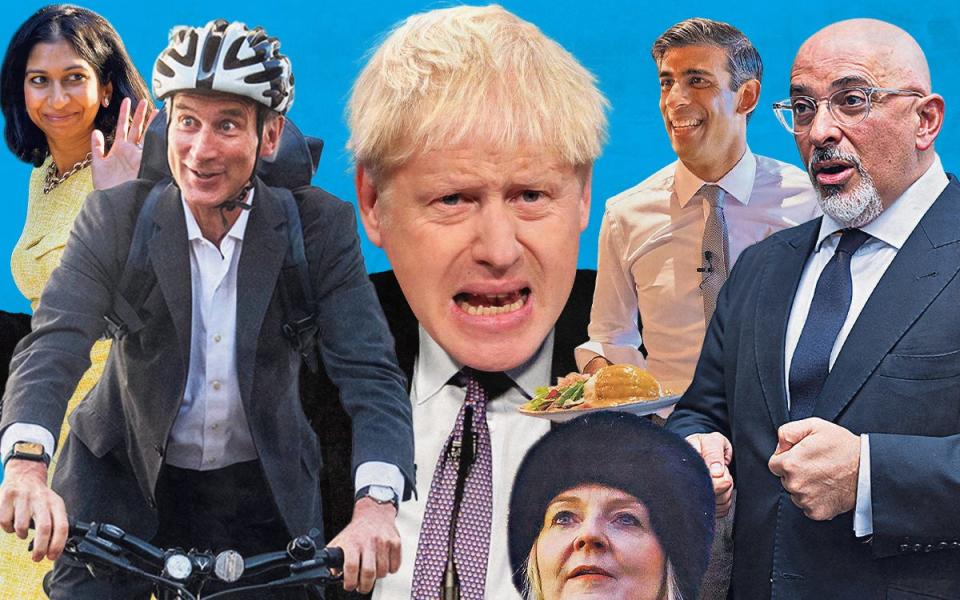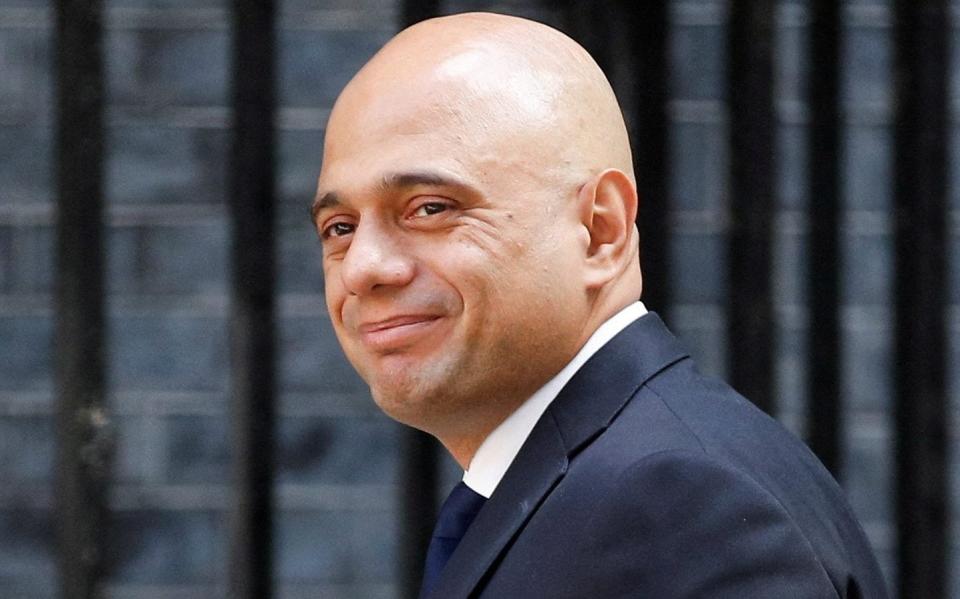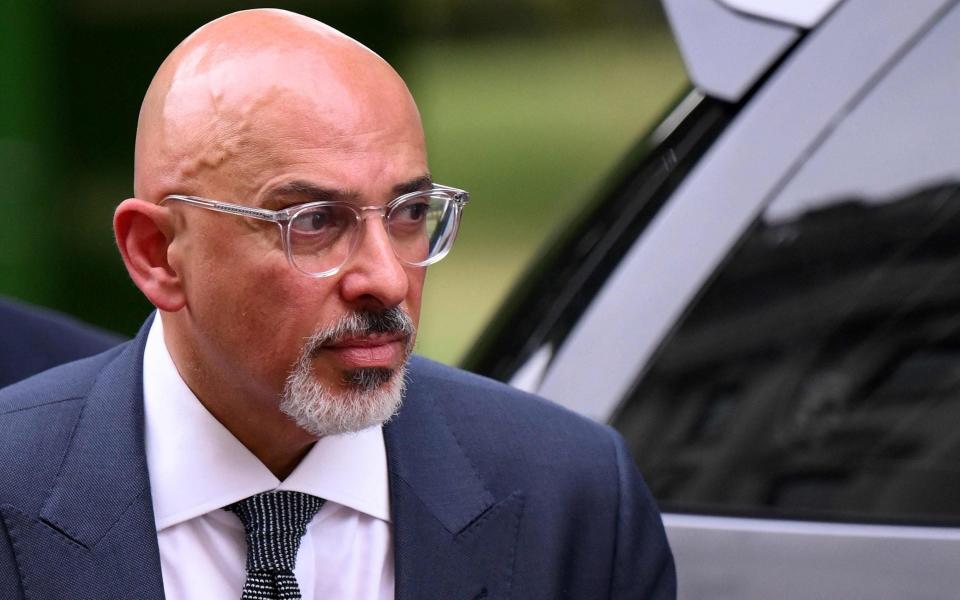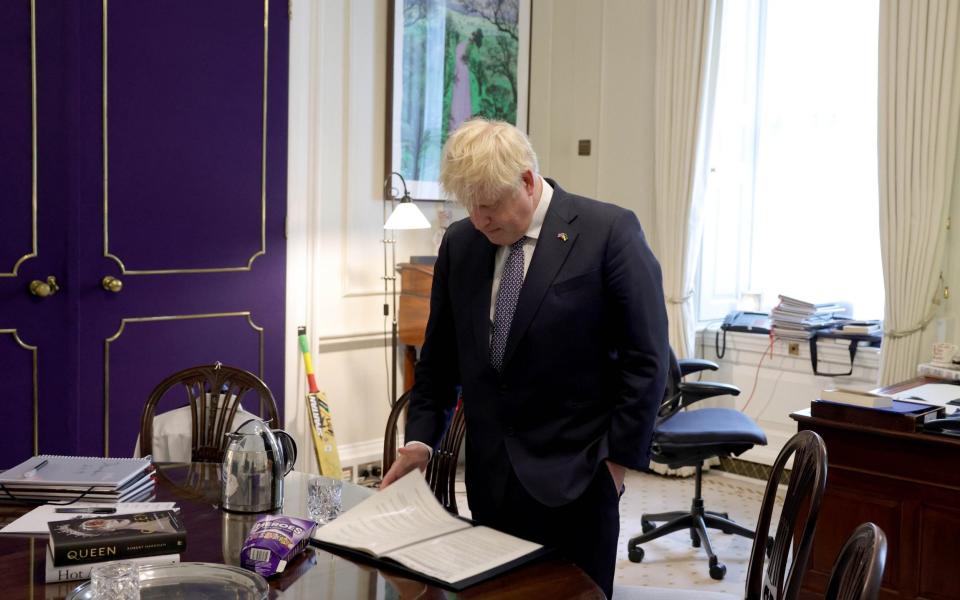Bust-up at summer party sets the tone for a messy Tory leadership battle

Their nerves had been shredded after the longest 48 hours of their lives, and in the sweaty, boozy crush of a Westminster garden party on Thursday night, the recriminations among the governing class were flowing as freely as the Pol Roger champagne.
The Prime Minister had resigned earlier that afternoon, but not before he had sacked Michael Gove, followed by a Number 10 character assassination of the latter as a “snake” and a “rat”.
It was all too much for Mr Gove’s ever-loyal adviser Josh Grimstone, who confronted Boris Johnson’s communications director Guto Harri and didn’t hold back.
“You’re a f------ disgrace!” Grimstone repeatedly barked, telling Harri his behaviour was “appalling”.
Grimstone not only blamed Harri for the poisonous briefings against his boss, but claimed Downing Street had effectively framed him by leaking the news that the then levelling up secretary had told Mr Johnson to resign – then claiming it was Gove who had told the press.
The bust-up at The Spectator magazine’s summer party may have seemed petty, but it was a taster for the sort of in-fighting that is likely to make the forthcoming leadership contest the ugliest on record.
As celebrity guests including Grayson Perry, Lord Frederick Windsor and his wife Sophie Winkleman chatted to star-struck Tory types, MPs and their staff were quietly going about the business of tearing the various leadership candidates to shreds.
One Tory grandee dismissed most of the field as “joke candidates”. Another claimed Penny Mordaunt only had short odds with the bookies because “rich backers” had placed multiple bets on her to force the odds down. Sajid Javid was dismissed as “the intern”, Liz Truss as “a fake”. Jeremy Hunt was “dead on arrival”. Ben Wallace “can’t win and if he runs it will cost him his Cabinet career”.
Two of the early front runners, the Chancellor Nadhim Zahawi and his predecessor Rishi Sunak, were at the party, vigorously drumming up support among MPs and journalists alike. But, behind their backs, and only a few feet away, others were trying to strangle their leadership hopes at birth.
Zahawi was trashed as “a fraud” by one Whitehall staffer, who claimed that his role in the vaccines rollout when he was vaccines minister amounted to “two per cent”. Sunak’s personal tax affairs were repeatedly raised, along with his tax policies. It didn’t help that Jacob Rees-Mogg was simultaneously taking to the airwaves to dismiss him as a “not very successful chancellor”. Only Theresa May, absent from the Spectator party, seemed to be enjoying herself – she and her husband Philip were filmed dancing energetically to Craig David’s aptly titled ballad Nothing Like This at the Henley Festival.
The next morning, Dominic Cummings, Mr Johnson’s former chief adviser turned arch enemy, turned up the heat further as he gleefully took to Twitter to set the fuses on a new series of “Dom bombs” about the candidates, suggesting at least two of them were sleeping with their special advisers (spads).
“At least three current candidates would be worse than Boris,” he claimed. “At least one is more insane than Truss, clearly unfit to be anywhere near nuclear codes. At least one a spad sh-----. Odds of an improvement dangerously close to 50:50!”
He later added: “Sorry, correction, I’m informed by Cabinet Office ‘at least 2 spad sh-----s’! Would be very Westminster for Boris to get the bullet cos of lies over sex/groping & SW1’s inability to deal with it, only to be replaced by someone actually sh---ing their spad!”
Whether there is any truth in the allegations is beside the point – enemies of the various candidates are already sharpening their knives, and anyone who does run would be well advised to clear any skeletons out of their cupboard now.
One Downing Street source summed things up thus: “You’re going to have a circus; a clown show. What’s going to happen in the next 72 hours is going to be an extremely intensive live-fire exercise where various people jump up, charge forward, promote themselves and get shot up. It’s going to be a messy business.”
‘The herd is stampeding’
After surviving the controversies over partygate, wallpapergate and the Owen Paterson affair to name but three, no one could have foreseen that it would be a scandal which did not even directly involve the Prime Minister that finally brought him down.
It was on June 30 that Chris Pincher resigned as deputy chief whip after admitting he had “embarrassed myself and other people” after he “drank far too much” and allegedly groped two men at the Carlton Club in Piccadilly, the Conservative Party’s de facto private common room.
Not for the first time in political history, it was not the incident itself that set the dominoes toppling, but the way Downing Street misled the public about Mr Johnson’s prior knowledge of Pincher’s behaviour before he promoted him.
Having claimed Mr Johnson was not aware of any allegations against Mr Pincher at the time – a line that was parrotted by ministers as they were sent out for TV and radio interviews – Number 10 kept changing its story until, on Monday, it admitted Mr Johnson had, in fact, been personally made aware of previous similar claims, but that they had been “resolved”.
Both Sajid Javid, the then health secretary, and Rishi Sunak had both spent time last weekend mulling over the idea of resigning over the Pincher affair. When Lord McDonald, who was the top civil servant at the Foreign Office during Mr Johnson’s time there, disputed Mr Johnson’s account on Tuesday morning, Mr Javid decided enough was enough.
Picking up the phone to Michael Gove, Mr Javid told him he was thinking of resigning and wondered whether Mr Gove was thinking the same. Mr Gove told him that his personal history with Mr Johnson, having derailed his leadership ambitions in 2016, meant he could not be seen to betray him yet again, but offered instead to advise the Prime Minister to resign.
By Tuesday afternoon Mr Javid felt he could wait no longer. He went to see Mr Johnson in Downing Street and told him of his intention to quit. During the meeting Mr Johnson allegedly admitted that Number 10 had lied over the Pincher affair but blamed his team for deciding to do so. Mr Javid told him: “You can’t keep blaming your team” and, at 6.02pm, announced via Twitter that he had quit. Mr Sunak, who had warned the Prime Minister over the weekend that he, too, was wobbling, had already written a resignation letter – a tweaked version of one he had written when he was fined over partygate in April before deciding to stay on, according to insiders.
Without giving Mr Johnson any warning that he was about to go, Mr Sunak tweeted out his own resignation, nine minutes after Mr Javid’s. Mr Sunak and Mr Johnson have not spoken since.
Although Mr Sunak had “got wind” of Mr Javid’s thoughts of resigning, and had prepared his own letter just in case, Mr Javid’s allies insist he had no idea whether anyone else would follow him over the top (in the end more than 50 did). One ally said: “He thought he was going to be out on his own and facing months of abuse from the flying monkeys.”

By Tuesday night, 10 members of the Government had resigned and four backbenchers had withdrawn their support for Johnson, but he remained convinced he could weather the storm. Nadhim Zahawi agreed, accepting the post of Chancellor, while Michelle Donelan agreed to be Education Secretary.
Mr Zahawi barely slept on Tuesday night, working on a new economic plan, including tax cuts, that he intended to launch next week, and he toured broadcast studios on Wednesday morning without having set foot in the Treasury. As he tried to set out his vision for the economy, he kept being interrupted to be told another minister, and then another, had resigned.
By 10.30am Mr Gove was in Mr Johnson’s Downing Street study attempting to read him the last rites, but Mr Johnson wasn’t listening. Instead, Number 10 staff angrily accused him of “bull-------” his way into the PM’s diary by “pretending he had good news”. After his failure to talk the PM round, Mr Gove headed to another room in Downing Street to begin his weekly task of preparing Mr Johnson for Prime Minister’s Questions in the Commons.
“In the time it took him to walk from one room to another the news was leaked to the press that he had told the Prime Minister to go,” claimed one Johnson loyalist. Gove loyalists, meanwhile, claimed Downing Street staff had “stitched Michael up” by leaking the news themselves and making it look as though it came from him.
Still the resignations kept coming, but Mr Johnson headed off to PMQs in a bullish mood, only to find the atmosphere on the Government benches funereal, as three of his own MPs, including Mr Javid, publicly told him to go. He remained unmoved, prompting one Tory backbencher to compare him to “a cockroach in a nuclear apocalypse”.
As he prepared for his next engagement of the day, a 3pm appearance before the Commons liaison committee, Chris Heaton-Harris, the chief whip, was approached by several Cabinet ministers who told him they intended to go, but he persuaded them to see the Prime Minister in person before they made a final decision.
Meanwhile the executive of the 1922 Committee of backbench MPs was meeting to decide whether to change its rules to allow for a fresh confidence vote sooner than the 12-month grace period currently allows.
During the liaison committee meeting, Mr Johnson learned from the Labour MP Darren Jones that Cabinet ministers were on their way to Number 10 to urge him to go.
As Grant Shapps, Nadhim Zahawi, Brandon Lewis and others assembled in Number 10, they were shown to an upstairs waiting room while they waited for Mr Johnson to return from the Commons and then hold his weekly telephone audience with the Queen.
What the Prime Minister and the Monarch discussed is never likely to be revealed, but Number 10 insiders insist that their conversation did not have any bearing on his eventual decision to resign. One by one, the waiting ministers were led downstairs to the Cabinet room for their meetings with the PM.
Mr Zahawi was first, telling him that over the course of the day, and with dozens more resignations, it had become obvious that “the herd is stampeding and it can’t be stopped”.

Mr Shapps, who had arrived as early as 5pm, had to wait nearly two hours for his audience, but he put a compelling argument to the PM. As the Tory Party’s master of the spreadsheet, Mr Shapps has a knack of predicting the outcome of key votes. His prediction of the result of last month’s confidence vote was out by just one, and his predictions have proved similarly reliable in leadership contests.
“Grant told the PM that he had crunched the numbers and if there was another confidence vote he would lose,” said a source. “He said he wouldn’t lose by a huge margin, but he would lose nonetheless, and the situation was worsening all the time.”
Mr Shapps, ultra-loyalist Priti Patel (who slipped in through a back door) and Brandon Lewis, the then Northern Ireland secretary, who was the last into Downing Street as he had to fly back from Belfast, all urged Johnson to “go with dignity” and set his own timetable rather than being kicked out.
One Cabinet minister was unable to visit in person because of a medical appointment, but phoned Mr Johnson from a hospital to tell him the same. Simon Hart, one of those who had urged Johnson to go, resigned at 10.30pm. Then Suella Braverman, the Attorney General, took the extraordinary step of announcing on ITV’s Peston show that she would be standing for the leadership, even though there was, at that point, no vacancy. Chaos had taken hold.
.@Peston: A number of your colleagues have wondered if you have thought about standing?@SuellaBraverman: I’ll be honest with you, Robert. Yes, I will.
The Attorney General says she wants to be the UK’s next Prime Minister.#Peston pic.twitter.com/mpjcDejEoe— Peston (@itvpeston) July 6, 2022
Still Mr Johnson believed he could survive. Andrew Mitchell, the former chief whip, said at the time: “It’s a bit like the death of Rasputin. He’s been poisoned, stabbed, he’s been shot, his body’s been dumped in a freezing river and still he lives.”
As Mr Zahawi made his way home on Wednesday night, he read that Downing Street had briefed that he and Mr Johnson would be making a speech the next day on tax cuts. He had not consented to it, told friends it was not happening, and wrote an open letter, published the next morning on Treasury notepaper, urging Mr Johnson to “do the right thing and go now”.
Down with his ship
In fact, Mr Johnson had already made up his mind by then. Having slept on the matter, he got up at 6am on Thursday and decided the game was up.
“It was all down to the numbers,” said one insider. “There was no dramatic moment where he had a tearful heart to heart with his wife, there was no key intervention. He just looked at the numbers and realised he couldn’t carry on. To have a functioning government you have to put bums on seats, and if you can’t put bums on seats you’re done.”
By 7.30am Mr Johnson had written the first draft of his resignation speech and called his closest aides to a meeting in the Thatcher Room on the first floor of Number 10, which was once the former leader’s office.
“There was a small group of people there and he said: ‘It’s over,’” said one source. In the room were Ben Gascoigne, the PM’s political secretary; Ben Elliott, the party co-chairman; Guto Harri; the chief whip; Cabinet Office minister Nigel Adams; Ross Kempsell, political director of the Conservative Research Department, and Number 10 head of operations Shelley Williams-Walker. Others who were “in and out” of the meeting included Cabinet Secretary Simon Case and Johnson’s wife Carrie. No one tried to change his mind.
“He didn’t lose his sense of humour,” said one Downing Street source. “He was witty and upbeat, and any tensions within the team were jumped on by him. He was a strong captain, standing on the bridge as the ship went down.”

One of his first phone calls of the day was to the Queen, to ensure Her Majesty was one of the first to know about what was coming. Then Mr Johnson spoke to Sir Graham Brady, the chairman of the 1922 Committee, who agreed he would be allowed to stay on until a new Tory leader was elected.
As Mr Johnson honed his speech, in which he waved away the troubles of recent months as “sledging” by his enemies, some members of his team urged him to say that “Brexit is now in danger”, but Mr Johnson – perhaps belatedly showing a modicum of wisdom – decided to omit such incendiary language.
Before heading to the lectern in the street outside his front door, Mr Johnson spent 10 minutes alone, composing his thoughts. One senior official was heard crying in the toilets before filing out into the road to support the PM as he made his speech.
None of them could hear him as he spoke, thanks to anti-Johnson protesters shouting “Boris out” and “Bye bye Boris” from the gates of Downing Street to drown him out, meaning people standing just yards away had to listen to a broadcast of it on their mobile phones.
By mid-afternoon Mr Johnson had refilled the empty Cabinet posts and held a meeting of his new-look team, dubbed the “Ikea Cabinet” because it was so hastily assembled, and joked that he had behaved like the Japanese soldier in the jungle still fighting the war years after it finished.
Sycophancy, which had been in short supply over the previous 48 hours, returned to the room, as Alister Jack, the Scottish Secretary, told Mr Johnson he had three main qualities: “You’re kind, too kind at times, and you pay the price. You’re loyal, perhaps too loyal and you paid the price. And you’re fearless – the best quality of all.”
Mr Johnson told them: “I think we need to plough on before I take out my onion.”
Runners and riders
With Sunak, Braverman and Tom Tugendhat, the chairman of the foreign affairs select committee, already declaring their candidacies, a frantic race has started to recruit able people to campaign teams.
“Everyone is trying to hire people from the digital team at Conservative Campaign Headquarters,” said one source. “They know social media will be vital but they don’t all know how to do it. There will be a mass exodus of CCHQ’s social media people.”
Mr Sunak, Mr Zahawi, foreign secretary Liz Truss and former minister Jeremy Hunt have the most advanced campaigns, as all of them have been in campaign mode for months. Mr Javid will go from a “standing start”, his allies say, putting him at a disadvantage.
Ben Wallace and Penny Mordaunt are among the early front runners with the bookies, while Kemi Badenoch, the former levelling up minister, is emerging as a strong outside bet, with strong support among 2019 intake MPs. Mr Gove – and Mr Cummings – are said to be fans.
Mr Tugendhat, despite having no ministerial experience, cannot be completely dismissed, as he has the backing of former Cabinet minister Damian Green, the chairman of the One Nation caucus of centrist Tory MPs, which has claimed in the past to have 110 MPs in its ranks.
Tory MPs, who will whittle the leadership contenders down to a final two, are hopelessly divided over who is likely to prevail. The only consensus is that the leader will be chosen by the party members, after a series of hustings, because no one will be prepared to pull out of the race to allow a “coronation” of a rival. There is also a prevailing opinion that a hustings battle is needed, to test the mettle of the contenders, after Theresa May was found wanting having been given a bye to Number 10 with the withdrawal of Andrea Leadsom in 2016.
Next week the 1922 Committee will set out the rules and timetable of the leadership contest, including the minimum number of MP backers needed to enter the race, with an expectation that the winner will be in place by the time Parliament returns from its summer break in September.
The victor will face daunting challenges, not least the cost of living crisis – which is likely to get worse just as they start their new job – and the war in Ukraine.
They will also be boxed in by Mr Johnson’s policies: the Government was elected on Mr Johnson’s manifesto, and has no mandate for any major policy changes. A significant change of direction would therefore risk a general election. Catch-22.
With the prospect of weeks of savage in-fighting to come, their most difficult task of all might be putting their party back together to give it a fighting chance of winning again in 2024.

 Yahoo Sports
Yahoo Sports 